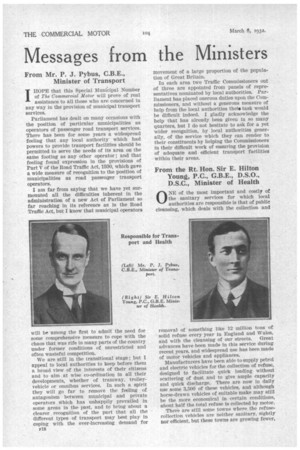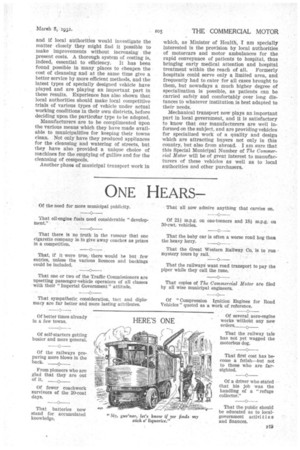Messages from the Ministers
Page 76

Page 77

If you've noticed an error in this article please click here to report it so we can fix it.
From Mr. P. J. Pybus, C.B.E., Minister of Transport
IHOPE that this Special Municipal Number of The Commercial Motor will prove of real assistance to all ti lose who are concerned in any way in the provision of municipal transport services.
Parliament has dealt on many occasions with the position of particular municipalities as operators of passenger road transport services. There has been for some years a widespread feeling that any local authority which had powers to provide transport facilities should be permitted to serve the needs of its area on the same footing as any other operator ; and that feeling found expression in the provisions of Part V of the Road Traffic Act, 1930, which gate a wide measure of recognition to the position of municipalities as road passenger transport operators.
I am far from saying that we have yet surmounted all the difficulties inherent in the administration of a new Act of Parliament so far reaching in its reference as is the Road Traffic Act, but I know that municipal operators will be among the first to admit the need for some comprehensive measure to cope with the chaos that was rife in many parts of the country under former conditions of unrestricted and often wasteful competition. We are still in the transitional stage; but I appeal to local authorities to keep before them a broad view of the interests of their citizens and to aim at wise co-ordination in all their developments, whether of tramway, trolleyvehicle or omnibus services. In such a spirit they will go far to remove the feeling of antagonism between municipal and private operators which has unhappily prevailed in some areas in the past, and to bring about a clearer recognition of the part that all the different types. of i ransport may best play in coping with the ever-Increasing demand for F18 movement of a large proportion of the population of Great Britain.
In each area two Traffic Commissioners out of three are appointed from panels of representatives nominated by local authorities. Parliament has placed onerous duties upon the Commissioners, and without a generous measure of help from the local authorities theio task would be difficult indeed. I gladly acknowledge the help that has already been given in so many quarters, but I do not hesitate to ask for a yet wider recognition, by local authorities generally, of the service which they can render to their constituents by helping the Commissioners in their difficult work of ensuring the provision of adequate and efficient transport facilities within their areas.
From the Rt. Hon. Sir E. Hilton Young, P.C., G.B.E., D.S.O., D.S.C., Minister of Health
0 NE of the most important and costly of the sanitary services for which local authorities are responsible is that of public cleansing, which deals with the collection and removal of something like 12 million tons of solid refuse every year in England and Wales, and with the cleansing of our streets. Great advances have been made in this service during recent years, and widespread use has been made of motor vehicles and appliances. Manufacturers have been able to supply petrol and electric vehicles for the collection of refuse, designed to facilitate quick loading without scattering of dust and to give ample capacity and quick discharge. There are now in daily use some 3,500 of these vehicles, and although horse-drawn vehicles of suitable make may still be the more economical in .certain conditions, about half the total refuse is collected by motor. There are still some towns where the refusecollection vehicles are neither sanitary, sightly nor efficient, but these towns are growing fewer, and if local authorities would investigate the matter closely they might find it possible to make improvements without increasing the present costs. A thorough system of costing is, Indeed, essential to efficiency. It has been found possible in many places to cheapen the cost of cleansing and at the same time give a better service by more efficient methods, and the latest types of specially designed vehicle have played and are playing an important part in these results. Experience has also shown that local authorities should make local competitive trials of various types of vehicle under actual working conditions in their own districts, before deciding upon the particular type to be adopted.
Manufacturers are to be complimented upon the various means which they have made available to municipalities for keeping their towns clean. Not only have they produced appliances for the cleansing and watering of streets, but they have also provided a unique choice of machines for the emptying of gullies and for the cleansing of cesspools.
Another phase of municipal transport work in which, as Minister of Health, I am specially Interested is the provision by local authorities of motorcars and motor ambulances for the rapid conveyance of patients to hospital, thus bringing early medical attention and hospital treatment within the reach of all. Formerly hospitals could serve only a limited area, and frequently had to cater for all cases brought to them, but nowadays a much higher degree of specialization is possible, as patients can be carried safely and comfortably over long distances to whatever institution is best adapted to their needs.
Mechanical transport now plays an important part in local government, and it is satisfactory to know that our manufacturers are well informed on the subject, and are providing vehicles for specialized work of a quality and design which are attracting buyers not only in this country, but also from abroad. I am sure that this Special Municipal Number of The Commer. cial Motor will be of great interest to manufacturers of these vehicles as well as to local authorities and other purchasers.












































































































































































